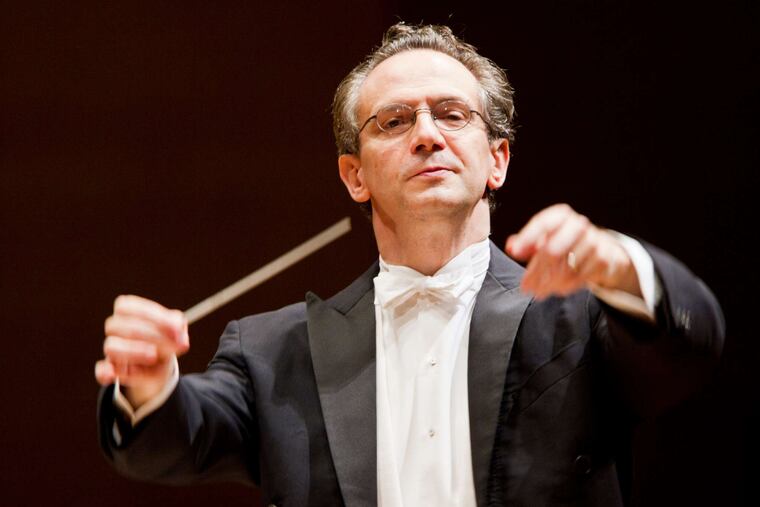It was the Philadelphia Orchestra at its best. But about that post-concert music ...
Fabio Luisi led the orchestra in a polished, powerful Tchaikovsky Fifth Symphony.

If on Tuesday night you were concerned about the artistic direction of the Philadelphia Orchestra, on Friday afternoon you could put your fears to rest. With Fabio Luisi on the podium, the orchestra snapped back into place.
The issue isn’t so much that the Radiohead-Brahms mashup earlier in the week was repertoire folly. But to stay on top, an orchestra needs time with great conductors honing the sound and ensemble perfection in core repertoire. Some of the best — Simon Rattle and Vladimir Jurowski come to mind — were once podium regulars here, and when they visited they left behind an ensemble in better shape than the one they found. Neither conductor has been here in years.
Luisi has a special sensitivity to the sound of this orchestra. Had career vagaries lined up differently, he would have been a natural successor to Wolfgang Sawallisch (whose tenure as music director ended two decades ago). He is that good.
Friday’s program came with the perfect personality vessel for both orchestra and conductor. A more idealized Tchaikovsky Symphony No. 5 is hard to imagine, so polished and fluidly unfurled were its dramatic episodes drawn. Noted before but worth repeating, Luisi, 63, is also an opera conductor — he was principal conductor of the Metropolitan Opera for more than five years, and now heads the Dallas Symphony Orchestra — and there’s always a sense of story in his music.
The Tchaikovsky is standard repertoire, a common starting point for everyone on stage. Not so with Nielsen. His Flute Concerto is rarely played here, and in form and instrumentation — solo flute dueling with both a balky bass trombone and timpani — it’s an appealing novelty item. The soloist was Jeffrey Khaner, the orchestra’s principal flutist, who was admirably powerful and resonant in the instrument’s silken low register. The cadenza work had some of his best moments, plumbing an emotional depth of great beauty.
Luisi also brought the orchestra its first-ever encounter with Nielsen’s Helios Overture. Again, it was a piece that capitalized on the orchestra’s strengths, moving from a low rumble to an embracing warmth, great brawn and, at its peak, incredible brilliance.
But it was the Tchaikovsky that became the program’s major artistic statement. Luisi’s vision was striking for being made up of dozens of ordinary (but wise) things that added up to an extraordinary interpretation. He’s no radical; tempos and dynamics were within a traditional range. And his core tempos were firmly laid down. But when he veered, phrases could lift like gusts or end as axe blows.
The dreamy second movement was a study in long-view emotional intensification. By the time the main theme reappeared late in the movement and the music reached its climax, you might have been a puddle of tears.
Luisi also pays close attention to ensemble balance. I don’t think I’ve heard the challenge met so squarely of emphasizing which note is the most important one in the tricky, nearly subterranean last chord of the first movement. The conductor brought out a double bass sound sturdy yet rounded. He is a conductor for both the head and the heart.
In an unfortunate post-concert coda, listeners still under the piece’s spell leaving Verizon Hall were met in the Kimmel plaza with a pop act already set up and performing at full volume. Could no one at the Kimmel have held off the plaza show for another five minutes to let crowds disperse with the Tchaikovsky still in their heads? It was jarring.
This isn’t about any kind of musical genre resentment. The moment simply killed a perfectly good Tchaikovsky buzz, which, if you’re an orchestra, is probably something you want to avoid.
Additional performance: Saturday at 8 p.m. in Verizon Hall, Broad and Spruce Streets. Tickets are $10-$165. philorch.org, 215-893-1999.